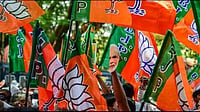A poet called me two months ago. He was worried and didn’t want to talk over the phone. He preferred a conversation in person fearing that someone might be listening in on the phone. But I asked him to talk. No one would bother to listen to our phone conversation. We are not that important. This calmed him and he came to the point. “Please remove my quote where I told you that I started writing emotional poetry about the loss and longing during the lockdown months after the abrogation of Article 370 in 2019,” he said.
That perturbed me a bit, but I told him that the story hadn’t been published yet. He was relieved. “You can write Covid lockdown instead of lockdown imposed after the abrogation of Article 370. I don’t want that you should attribute to me my original quote,” he said. There was more confidence and command in his voice, now.
I told him that since he is a poet, he should not be dishonest about the truth of his inspirations. I insisted that he shouldn’t change Article 370 lockdown into Covid-19 lockdown. This goes against any poet’s stature, I proffered. But he didn't relent. He was not being pressured by anyone to do this, he said. “No one is telling me to remove the line, but at times it is better to be silent. These are such times.”
I had to remove his quote altogether. I don’t know whether the line about Article 370 would have impacted the young poet’s career prospects or would have caused him any trouble from the state, but I understood his concern. There is silence all around in Kashmir of today, and nobody wants to be seen making any noise.
Like the poet, many are deleting or recasting their own memories, creating alternative ones: What happened to them in August 2019 actually happened to them in April 2020 due to Covid. Many are deleting their own archives from their memories and from their reading rooms. Kashmir's Twitter was buzzing for a few years. Today, it has fallen silent. Most argumentative and politically suave persons have removed themselves from Facebook. There were WhatsApp groups. A lot of them. People would post their comments over there. They would argue over there. They would fight over there. The groups no longer exist. Either their admins have disbanded the groups or people have silently exited from them during night hours presuming no one could see their midnight flight.
A few days ago, a young engineer was worried about Srinagar roads. Every paved road and footpath has been dug up, but nobody complains about the inconvenience it caused them. The roads are being repaired under the smart city project. In the past, observing the engineer, it would have become a huge issue and people would have sought an explanation from the government. The engineer felt that Srinagar is looking like an excavation site and it doesn't seem to bother anyone. “People behave in such a manner as if it is happening in some other city with some other people and it has nothing to do with them. This mass indifference towards the roads baffles me,” he said. Then he added the truth pill, saying, “I want to write about it but it is better to be silent.”
There is a collective consensus among Kashmiris, from all walks of life, over one issue: “remain silent and they should be also seen as silent”. There is a common view that it is the smartest thing to do today. It is the best thing. How an entire community reaches this conclusion is simply strange. It is inexplicable. But it is the reality.
I asked a journalist friend who is one of the prolific writers from Kashmir why he is not writing anymore. “I write but I no longer post anything on social media and that is the reason you don’t see it. It is better to be seen silent,” he said smiling.
If someone faces trouble these days, his friends don’t show any sympathy for him. Instead, they allege he talks too much. “When all others are silent why cannot he be silent,” they say. However, some people are still incorrigible. They say, “The silence is the resistance.” Some say, "This, too, shall pass," finding comfort and care in the Persian adage. Like much of our cultural heritage, we seem to have borrowed coping mechanisms from Iran as well.
You won’t see the Kashmiri arguing anymore. He doesn’t argue even about the dying Dal Lake or designer Pherans or whether the latest Kashmiri song is in sync with Kashmiri culture or not. Kashmir discussion has vanished from every sphere of life. The emotional Kashmir story is dead. Rather Kashmir story is dead.
A Kashmiri's response to everything happening around him or around the world is silence and indifference. This indifference and silence is so pervasive in the fabric of society that everyone can feel it. This silence and indifference have made some people in the administration curious, if not worried. Out of sheer curiosity, they are keen to know the meaning of this silence and its consequences. They look for the politics in this silence. They call people and ask them to make them understand the meaning of this silence. Some of the officials presume the silence is deadly and something will resurrect from this silence.
But the silence is silence and you need not find any other meaning or feeling in it. It is a realisation among people that whatever is happening will happen. You cannot stop it. It is also the deep understanding of your powers that you cannot do anything except be silent and watch things happen. For now, people have found solace in silence. You need not worry about this silence. It is so calm to see people so indifferent and so silent about happenings around. They have made enough noise over the years. It didn’t make any difference in their lives and in their surrounding. These are the best times to be silent. Maybe we will find nirvana in this silence. That is why I liked the poet's argument that at times silence is better.
The Nirvana In Silence
The only sound that punctuates the Valley is silence from its once argumentative and demanding citizenry.

The only sound that punctuates the Valley is silence...
The only sound that punctuates the Valley is silence...
Published At:
- Previous Story
 Youth Congress Protests Centre’s Silence On Key Issues; Over 150 Detained In Delhi
Youth Congress Protests Centre’s Silence On Key Issues; Over 150 Detained In Delhi - Next Story
MOST POPULAR
WATCH
MORE FROM THE AUTHOR
PHOTOS
×





















